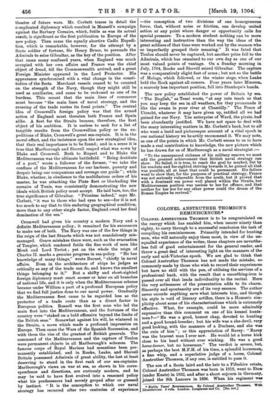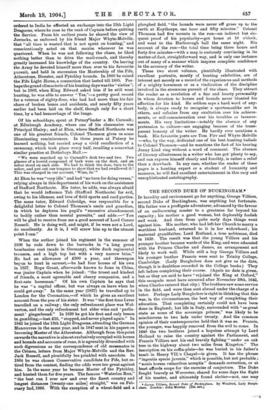COLONEL ANSTRUTHER THOMSON'S
COLONEL ANSTRIIIHEE THOMSON is to be congratulated on the energy which has enabled him, when nearer ninety than eighty, to carry through to a successful conclusion the task of compiling his reminiscences. Primarily intended for hunting men, who will naturally enjoy them most, in view of the un- equalled experience of the writer, these chapters are neverthe- less full of good entertainment for the general reader, and. throw a great deal of interesting light on the manners of the- early and mid-Victorian epoch. We are glad to think that Colonel Anstruther Thomson has not made the mistake, so commonly made by those who wish to record their experiences. but have no skill with the pen, of utilising the services of a professional hack, with the result that a smoothing-iron is. passed over all that lends individuality to the recital. Here- the very artlessness of the presentation adds to its charm. Sincerity and spontaneity are of its very essence. The author never records anything save what interests him, and though his style is void of literary artifice, there is a Homeric sim- plicity about some of his characterisations which is extremely effective. What, for example, could be more admirably expressive than this comment on one of his kennel hunts- men He was a good, honest chap, devoted to hunting- and a good hound-breeder; but his wife was a she-devil, very good looking, with the manners of a Duchess, and she was the ruin of him " ; or this appreciation of Rarey : " Rarey was the bravest man I ever saw. He would let a horse kick close to his head without ever winking. He was a good horse-tamer, but no horseman." The verdict is severe, but, as perhaps the best M.F.H. of his time, a splendid horseman,. 'a fine whip, and a superlative judge of a horse, Colonel Anstruther Thomson, if any one, is entitled to pass it.
The son of a Scots laird and the heir to a Fifeshire estate, Colonel Anstruther Thomson was born in 1818, went to Eton (under Keefe) in 1832, and after a short sojourn in Germany, joined the 9th Lancers in 1836. When his regiment was
• Eighty Years' B4111411i1C41W671. By Colonel Anstrather Thomson- With Illustrations. 2 vols. London: Longmans and Co. [Mc net.] ordered to India he effected an exchange into the 13th Light Dragoons, where be rose to the rank of Captain before quitting the Service. From his earliest years he shared the view of Jorrocke, as endorsed by his friend Major Whyte-Melville, that "all time is wasted that is not spent on hunting," and conscientiously acted on that maxim wherever he was quartered. When he was not following the chase, he liked nothing better than to drive the mail-coach, and thereby greatly increased his knowledge of the country. On leaving the Army he devoted himself more than ever to his favourite pursuit, and held in succession the Mastership of the Fife, Atherstone, Bicester, and Pytchley hounds. In 1860 he raised the Fife Light Horse, a connection that lasted till 1895. Per- haps the grand climacteric of his hunting days was the " sixties "; but in 1903, when King Edward asked him if he still went hunting, he was able to answer " Yes,"—a pretty good record for a veteran of eighty-four, who had had more than his fair share of broken bones and accidents, and nearly fifty years earlier had been laid on the shelf, though only for a short time, by a bad hemorrhage of the lungs.
Of his schooldays, spent at Putnefunder a Mr. Carmalt ; at Edinburgh Academy, where one of his classmates was Principal Shairp ; and at Eton, where Safford Northcote was one of his greatest friends, Colonel Thomson gives us some illuminating reminiscences. In three years at Putney he learned nothing, but carried away a vivid recollection of a ceremony, which took place every half, recalling a somewhat similar practice at Dotheboys Hall :— " We were marched up to Carmalt's desk two and two. Two glasses of a horrid compound of bark were on the desk, and an usher stood on each side. We had to drink the dose, turn to the usher, and put out our tongues to show that we had swallowed it ! This was charged in our account, Wine, 55."
At Eton he was "very idle" and had "no turn for doing verses," relying always in this department of his work on the assistance of Stafford Northcote. His tutor, he adds, was always afraid that he would influence Tab (Stafford Northcote) for evil, owing to his idleness, and love of field sports and card parties.
The same tutor, Edward Coleridge, was responsible for a delightful letter to Colonel Thomson's uncle and guardian, in which he deplores his pupil's "excessive abandonment to bodily rather than mental pursuits," and adds :—" You will be glad to receive from me a good account of Lord Cosmo Russell. He is doing well, and might, if he were not a Lord, do excellently. As it is, I will screw him up to the utmost point I can."
When the author joined his regiment in the summer of 1836 he rode down to the barracks in "a long green bombazine coat (made in Germany), white duck regimental trousers, and a high top bat with a very narrow brim." He had an allowance of £300 a year, and thereupon began to hunt in earnest,—he had four horses of his own in 1837. Hope Grant, afterwards known to fame in China, was junior Captain when he joined : "the truest and kindest of friends, a most agreeable and cheery companion, and a first-rate horseman." Of his own Captain he says that he was "a capital officer, but was always on leave when he could get away." In the same year (1837) he travelled up to London for the Coronation,—of which be gives an excellent account from the pen of his sister. It was "the first time lever travelled on a railway ; the only refreshment place was Wol- verton, and the only refreshment hot elder wine and ' parlia- ment ' gingerbread." In 1839 be got his first and only lesson in gambling,—lost £25, "stepped, and never played again." In 1842 he joined the 13th Light Dragoons, attending the German Manceuvres in the same year, and in 1847 sent in his papers on becoming Master of the Atherstone. Although from this point onwards the narrative is almost exclusively occupied with horses and hounds and accounts of runs, it is agreeably diversified with such digressions as the correspondence of old messmates in the Crimea, letters from Major Whyte-Melville and the Rev. Jack Russell, and plentifully hes prinkled with anecdote. In 1864 he was chosen Conservative candidate for Fife, but re- tired from the contest, finding the odds were too great against him. In the same year he became Master of the Pytchley, and hunted them for five years. The famous "Waterloo Run," "the best run I ever saw and over the finest country and longest distances [twenty-one miles] straight," was on Feb- ruary 2nd, 1866. With the exception of a wheat-field and a ploughed field, "the hounds were never off grass up to the earth at Keythorpe, one hour and fifty minutes." Colonel Thomson had five mounts in the run—an indirect but. elo- quent proof of his popularity—got home at 10 o'clock, and went to the Harborough ball the same night. His account of the run—the total time being three hours and forty-five minutes—with a map is curiously convincing in its matter-of-fact, straightforward way, and is only one instance out of many of a manner which inspires complete confidence in the accuracy of the writer.
These two stout volumes, plentifully illustrated with excellent portraits, mostly of hunting celebrities, are of interest not merely as a record of the experiences and methods of a mighty horseman or as a vindication of the discipline involved in the strenuous pursuit of the chase. They attract the reader as a revelation of a fine and hearty personality in whom devotion to horses and bounds never blunted his affection for his kind. He seldom says a hard word of any- body, is always ready to recognise a sportsmanlike act in others, and refrains from any exultation over his achieve- ments, or self-commiseration over his troubles or bereave- ments. His very limitations—notably the absence of any pretension to culture—are engaging because of the trans- parent honesty of the writer. He hardly ever mentions a book. His favourite poets are Tom Fin r and Whyte-Melville —who, by the way, dedicated one of his best hunting ballads to Colonel Thomson—and he mentions the fact of his hearing Jenny Lind sing without a word of comment. The absence of literary allusiveness in a writer who has got plenty to say, and can express himself clearly and forcibly, is rather a relief than a drawback. In any case, whether the reader of these pages is a hunting expert or a student of humanity and manners, he will find excellent entertainment in this racy and unsophisticated autobiography.











































 Previous page
Previous page